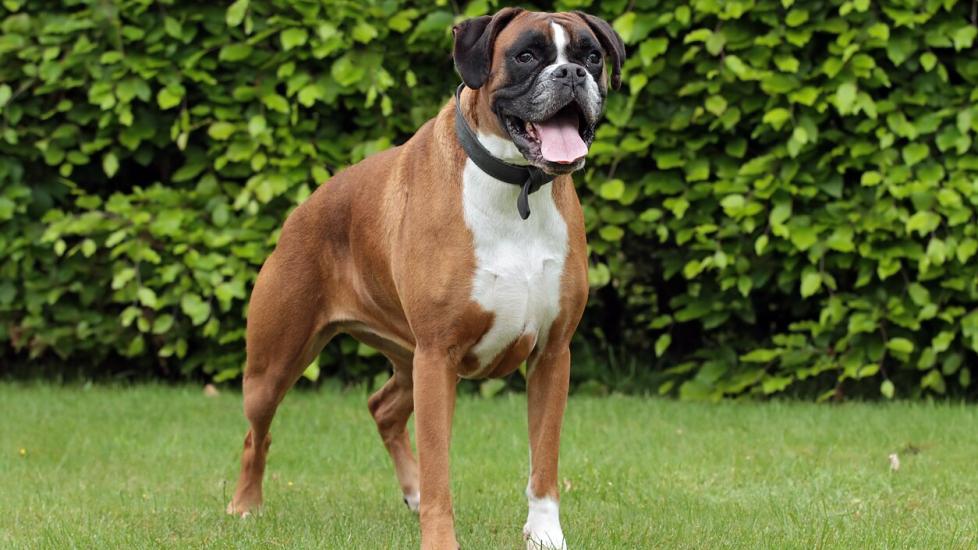Boxer
The Boxer dog was imported to the United States from Germany in the 1930s, according to the American Boxer Club, where they were used for hunting. This history means today’s Boxers are excellent runners and playful jumpers.
Boxers are deep-chested dogs that are usually well-muscled under their smooth coat. They are considered a medium-sized dog breed—weighing in around 65–80 pounds with an average height of 21–25 inches.
Caring for a Boxer Dog
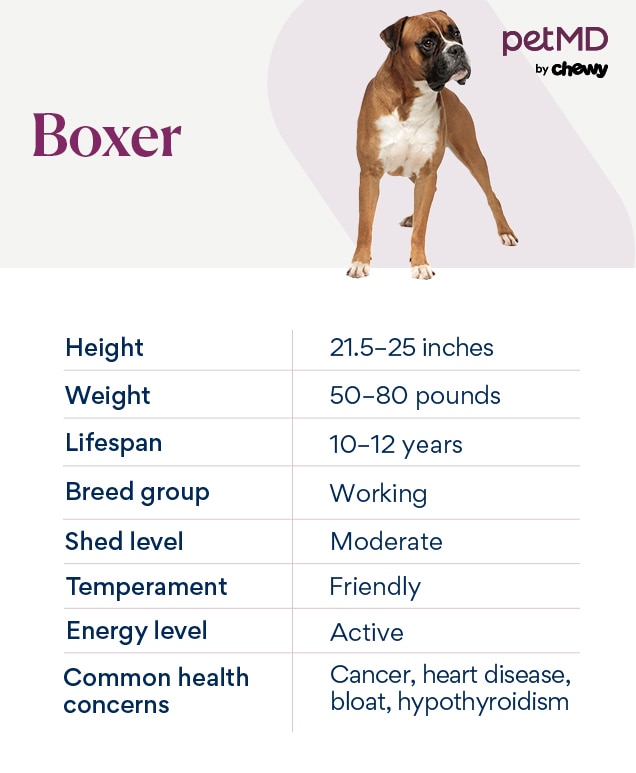
Their high-energy and spirited nature typically make Boxers good pets for active households. They require 30 minutes to two hours of exercise every day and, according to the breed club, can excel in dog sports such as rally, agility, and lure coursing. Providing enough exercise and mental stimulation is a big part of Boxer care.
But while Boxer dogs need lots of activity, they require very little grooming thanks to their short coat. Common Boxer colors include brindle, fawn, and white, and they can have white and black markings.
In the past, many Boxers had their ears cropped, but this trend has grown less popular in recent years and you will often see Boxers with floppy ears. The American Veterinary Medical Association (AMVA) opposes the procedure, as it’s done for cosmetic reasons and doesn’t have any proven health benefits.
Boxer Dog Health Issues

Boxers are prone to several health issues, so it’s important to talk with your veterinarian to have a strong preventative health routine in place. Pet parents may also want to invest in pet insurance when bringing home a Boxer puppy.
The typical Boxer lifespan is 10–12 years. They are a brachycephalic (flat-faced) breed, meaning that—along with the health issues listed below—they are prone to overheating and breathing issues.
Cancers
Cancer is one of the most common health conditions seen in Boxers. The types of cancer include:
-
Mast cell tumors (which can be on the skin or internal organs)
-
Canine lymphoma (a cancer of the lymph nodes and lymph system)
-
Osteosarcoma (bone cancer)
Treatments vary depending on the type of cancer a Boxer develops. Surgery is often used to remove the affected tissue. Referral for consultation with a boarded veterinary oncologist may be recommended. Chemotherapy, immunotherapy, and/or radiation therapy may be recommended.
Dilated Cardiomyopathy (DCM)
Dilated cardiomyopathy (DCM) is degeneration of the heart that causes the muscle to become very thin and pump weakly. Symptoms can include weakness, collapse, cough, trouble breathing, and bluish gums. The symptoms of the disease may occur suddenly or progress gradually as the disease worsens over time. DCM can eventually lead to congestive heart failure.
Often, the first sign of an issue will be a new heart murmur heard by your veterinarian during a routine physical examination. If a heart murmur is noted, your vet will likely refer you to a veterinary cardiologist for an echocardiogram (ultrasound of the heart) to determine the cause. If your pet is diagnosed with DCM, they will likely be prescribed daily cardiac medications for life as well as routine rechecks.
A correlation between DCM and grain-free diets has been found but is not fully understood. Talk to your vet about the risks and benefits before feeding a grain-free diet to your Boxer.
Arrhythmogenic Right Ventricular Cardiomyopathy (ARVC or “Boxer Arrhythmia”)
ARVC is a genetic disease that affects the Boxer dog breed and, rarely, other breeds. This condition occurs when the normal heart muscle is replaced by fatty and fibrous tissue, causing abnormal electrical activity and therefore irregular heart rhythm.
ARVC varies in severity and many Boxers with ARVC live several years before developing symptoms. ARVC is treated using medications that control the abnormal heart rhythm (antiarrhythmics).
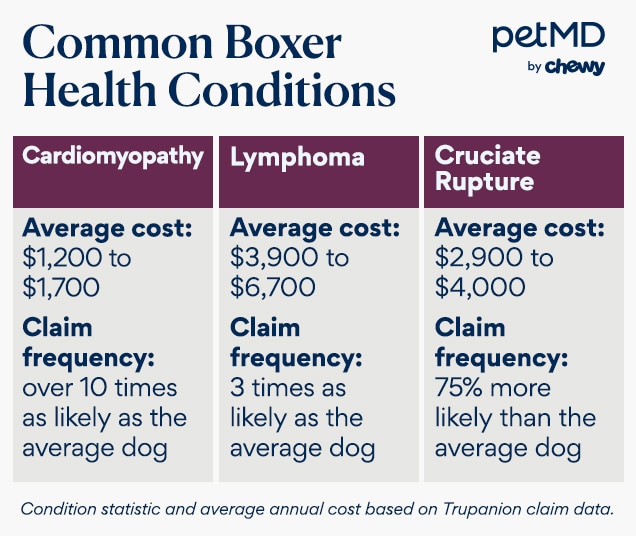
Gastric Dilatation-Volvulus (GDV)
Gastric dilatation-volvulus (a severe form of bloat in dogs) is a condition that occurs suddenly and requires immediate life-saving intervention. It occurs when the stomach fills up with food or gas, causing expansion and pressure.
The stomach can then rotate, which causes inadequate blood supply to the spleen and stomach. If not treated quickly, shock, tissue damage, and even death can occur.
Increased risk is seen in older dogs that have a deep chest (like the Boxer), dogs that are fed from elevated bowls, and dogs that are fed only once per day.
Immediate veterinary intervention is needed to stabilize and treat GDV. Initially, fluid therapy, oxygen therapy, and decompression of the stomach may be performed. Surgery is required to return the stomach to the right location and secure it in place (gastropexy). A gastropexy can also be performed preemptively to secure the stomach in the right position and prevent GDV from occurring.
Hypothyroidism
Hypothyroidism is a condition that causes the thyroid gland to be underactive. The thyroid gland controls the metabolism. In hypothyroidism, the body either attacks its own glands or the gland is replaced with fat.
Hypothyroidism is diagnosed using blood work. It’s treatable with a thyroid hormone replacement medication called levothyroxine, which will be a lifelong medication.
Cranial Cruciate Ligament Disease
The cranial cruciate ligament (CCL) is an important ligament that stabilizes the knee. In humans, this is known as the anterior cruciate ligament (ACL). The CCL can break down over time due to degeneration, genetics, obesity, and skeletal/joint conformation. When this ligament breaks down, it’s at risk of tearing, which destabilizes the joint.
Surgery is typically required to stabilize the knee. Dogs that have had a CCL tear in one knee have a 40–60% chance of tearing the other CCL. Maintaining a lean body condition helps prevent CCL disease, as excess weight adds to the breakdown of the ligament.
Find a CarePlus insurance plan to match your pet's needs
Learn about CarePlus, insurance plans with exclusive Chewy benefits
What To Feed Boxer Dogs
Feeding a commercial kibble or wet food approved by the Association of American Feed Control Officials (AAFCO) is a good way to make sure a Boxer receives a complete and balanced diet.
Boxers need quality protein for healthy muscles, including the heart. Additionally, omega-3 fatty acids (DHA/EPA) support healthy skin, coat, kidneys, and heart.
How To Feed a Boxer
Adult Boxer dogs thrive on being fed two meals per day, about every 12 hours. Using slow feeder bowls can help slow your Boxer down when they eat, which can help prevent bloat and GDV. Do not feed a Boxer from raised food bowls; this can increase the risk of bloat.
Boxer puppies need to eat more frequent meals, about three or four per day.
How Much Should You Feed a Boxer?
Just like humans, the recommended caloric intake varies between individuals due to differences in size, metabolism, health, and activity level. The best way to determine how much to feed your Boxer is to talk with your veterinarian and consult the feeding guide labels on your chosen dog food.
Maintaining a healthy weight is very important for protecting a Boxer’s joints.
Nutritional Tips for Boxers
Boxers can also benefit from the addition of omega-3 fatty acids (DHA/EPA) into their diets. Omega-3 fatty acids can be found in skin and joint supplements, fish oil, and even in some specially formulated dog foods. These fatty acids will act as natural anti-inflammatories that help to support the skin, coat, kidneys, joints, and heart.
Never give your dog supplements without talking to your vet first.
Behavior and Training Tips for Boxer Dogs
Boxer Dog Personality and Temperament
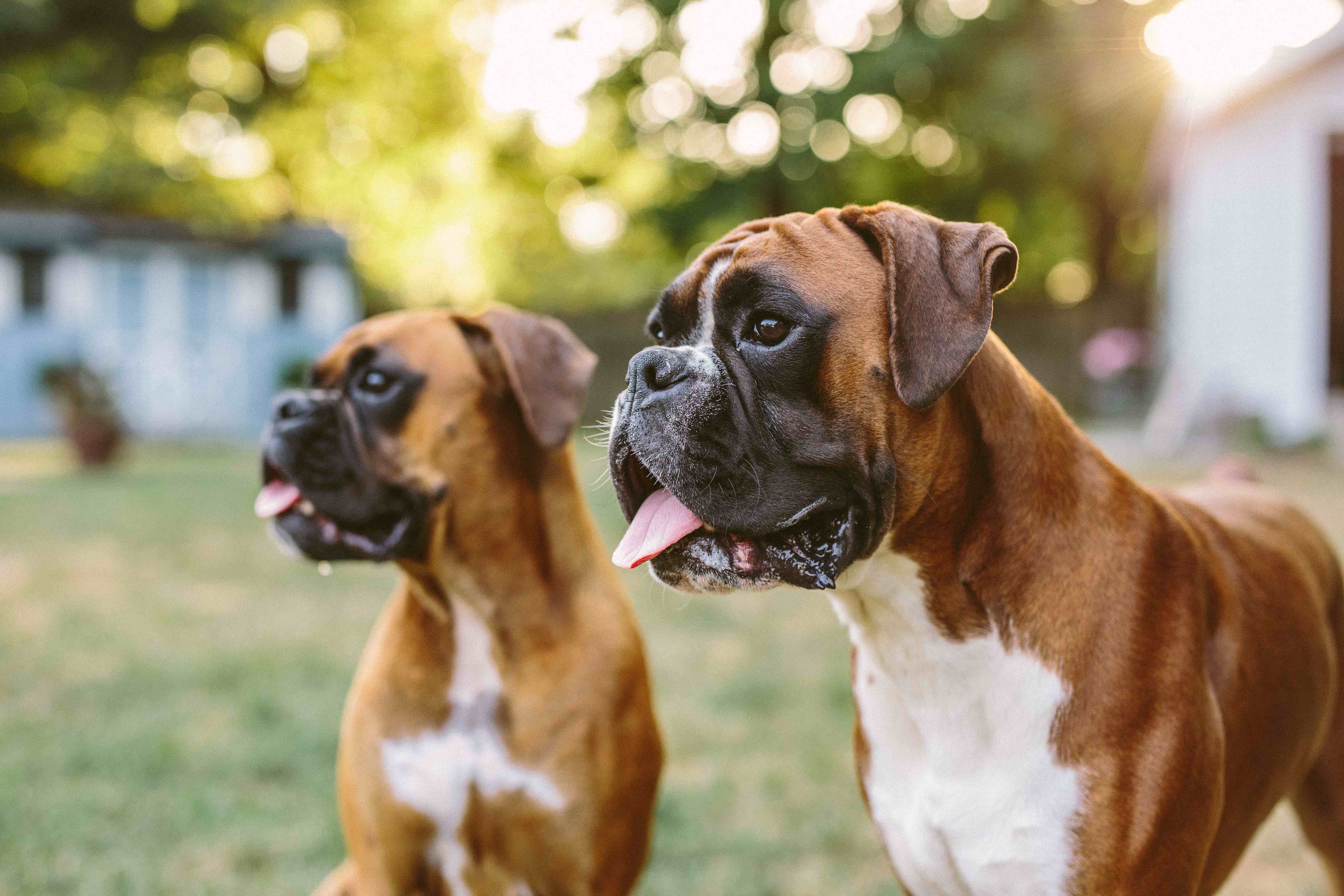
Boxers are happy, playful dogs with a lot of energy. They are known to jump and paw when they play, so teaching them to stay down is beneficial. Because of their tendency to jump, Boxers may not be the best breed for families with young children unless they’re well trained to keep all four paws on the ground.
Boxer Dog Behavior
Because of their history as hunting dogs, Boxers have a prey drive and can be tempted to chase after birds and small mammals. They should be kept on a leash or inside a fenced-in space whenever they’re outside, and introductions to smaller pets like cats must be done properly and slowly.
Many Boxers enjoy digging in the yard and may even tunnel under a fence. Supervision is important when your pup is outside.
Early leash training can help stop your dog from pulling on the leash while walking, which is common in Boxers.
Boxer Dog Training
Boxers are very intelligent and trainable, but they often require patience due to their high energy level. They will learn if given clear and consistent guidance through positive reinforcement training.
Socializing Boxer puppies at an early age is incredibly important, as it will help your pup grow into a confident and polite dog that’s not fearful around new people, animals, and situations.
Fun Activities for Boxers
Boxer Grooming Guide
The Boxer is a relatively low-maintenance dog breed when it comes to grooming.
Skin Care
Boxers do not require any special skin care treatment. You can include omega-3 fatty acids in their diet to help support their skin and coat with your veterinarian’s guidance.
Contact your vet if you notice any changes in your dog’s skin.
Coat Care
Boxers have a short coat that sheds moderately. To keep their coat as healthy as possible, consider brushing them weekly. Boxers can be bathed monthly, if needed, or less frequently if they are keeping themselves clean.
Eye Care
The Boxer breed does not have any special eye care requirements. Schedule a vet appointment if you notice any changes in your dog’s eyes such as discharge, redness, or cloudiness.
Ear Care
To keep your Boxer’s ears healthy, it’s recommended to clean their ears twice a month to prevent infections. Use a veterinary-approved ear cleaner.
Considerations for Pet Parents
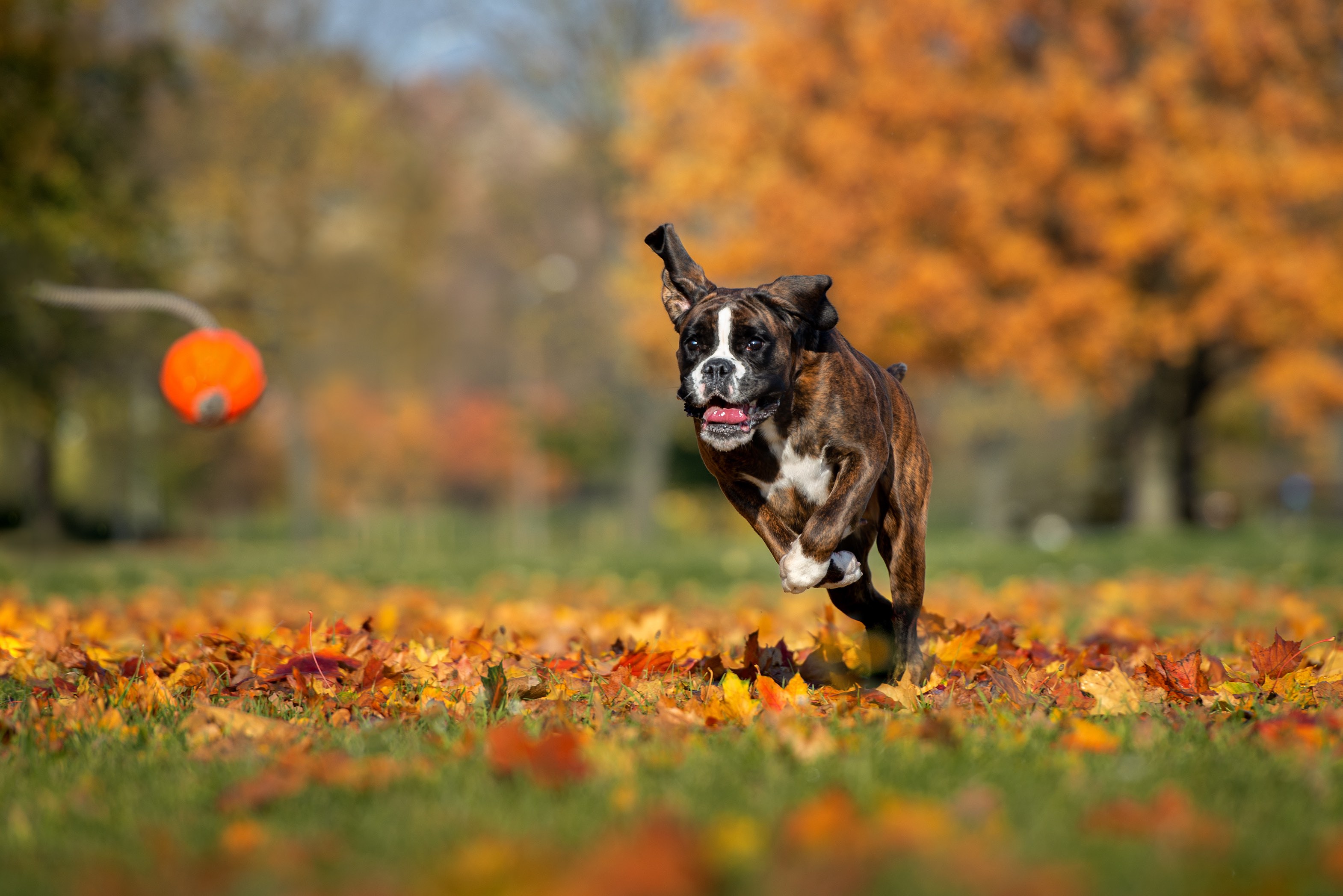
Healthy Boxers should still have a physical examination with a veterinarian at least once a year. Boxers are predisposed to several heart conditions, including dilated cardiomyopathy and Boxer arrythmia, among others. The breed must be monitored for signs of exercise intolerance, lethargy, or coughing, as these could be signs of a developing heart condition.
Boxers should also be regularly monitored for skin tumors, as these may be cancerous. Additionally, signs of internal cancer may include lethargy, decreased appetite, weakness, or weight loss.
Boxers are a high-energy dog breed known for bouncing around. Therefore, they are not the most ideal dog breed for households with young children, frail individuals, or senior adults who can be knocked down easily.
Boxer Dog Breed FAQs
Is a Boxer a good family dog?
When well-socialized at an early age, the Boxer can be a good family dog. Their high energy and jumping may make them less than ideal pets for frail individuals and young children.
Are Boxers smart dogs?
Boxers are very smart dogs that can be trained when given clear, consistent cues. Because they’re so energetic, training can take patience.
How long do Boxers live?
A Boxer’s lifespan is 10–12 years on average.
Do Boxers shed?
Boxers do shed a moderate amount, and weekly brushing can help remove loose hairs before they end up on your furniture.
Featured Image: iStock.com/madcorona
References
Cornell University College of Veterinary Medicine. Canine Dilated Cardiomyopathy (DCM)
Cornell University College of Veterinary Medicine. Arrhythmias (Abnormal Rhythms) in Dogs.
American College of Veterinary Surgeons (ACVS). Gastric Dilatation-Volvulus.
American College of Veterinary Surgeons (ACVS). Cranial Cruciate Ligament Disease.
